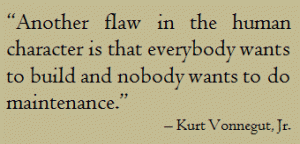Fragility, thy name is living
When something important in life goes wrong, it colors our reaction to later experiences.
For example, back in the late 90s I owned a bunch of stock options that had been granted by my employer. One day, to everyone’s surprise and delight, the price of that stock began a very steep and seemingly endless climb into the stratosphere. Within a few months it had made me a millionaire (on paper). But then, just as unexpectedly, the bottom fell out. By the time I understood that this wasn’t just a temporary dip, it was too late.
Therefore, a few years later when home prices in my city began emulating that stock, I resolved not to make the same mistake twice. My wife and I sold our house at the peak. Smart move? Well—maybe. The two situations weren’t entirely comparable, because we still had to reside somewhere, and I’ve never been comfortable with my living situation since then. But selling was an effort to stay in control—to be a participant at least in unfolding events, to hold onto value even at the cost of giving up something else.
I’m telling that story simply to illustrate the effect past disappointment can have on future decision making: Once bitten, twice shy. Pain avoidance motivates the most basic kind of learning.
And there is pain, and loss, to be experienced in life, often with consequences far more dire than a mere financial setback. We don’t like to think about it, but each of us is vulnerable to drastic upheavals. Look at your own life or look at the headlines over the last month. Bad stuff goes down, and no one seems able to foresee or prevent it.
The experts in whom we like to put our trust typically appear to be as surprised and helpless as anyone else.
Naturally, each of us wants to minimize pain and improve life. But in trying to control outcomes, we tend to have imperfect results (as happened when I sold the house). And here’s the idea I’m struggling to express: In view of the fragility of peace and comfort, maybe we need to revisit our priorities. Perhaps we ought to try first of all to remember and appreciate the good in what we now have—as opposed to taking that for granted while grasping for something else.
Another personal story may illustrate this. Prior to my family’s misadventures in the dot-com and housing bubbles, we had a baby with acute problems that profoundly affected his development. Something bad—nobody knew just what—had happened to him prior to and/or during birth. My memoir is the story of our uphill struggle to make things right again. Or at least to make things less bad. Typically, anything lost (health, trust, etc.) is very difficult to restore fully. Even a partial restoration is no sure thing. But we knew the cause was worthy. And the campaign we launched on Joseph’s behalf led, for a time, into some of the most intense and stimulating and even exhilarating living I have ever known. But as he progressed along the pathway toward a condition that we viewed as his birthright (wellness), the going became more difficult, for all of us, and the impact on Judy and me became impossible to ignore. There came a point beyond which it made no sense to continue sacrificing assets we had in pursuit of something we might never achieve.
There may be differences of opinion as to just where that point was—but we crossed it. At speed.
I believe Judy’s death was one consequence.
Even so, despite knowing that we crossed it, and knowing what was lost when we did, I remain susceptible to temptations that could put our family on the same course once again. I must be careful.
Sometimes, having anything good at all seems almost miraculous. I hope this doesn’t sound like a platitude. The mindfulness I’m thinking about involves renewed commitment every day to maintain, yes, even defend, blessings that we will most certainly miss if we no longer have them. Examples of this overlooked maintenance might include:
- Getting exercise and enough sleep, managing stress, eating properly, etc.
- Using seatbelts and generally avoiding needless risks
- Following a budget, eliminating debt, reviewing financial goals
- Participating in and contributing to the community
- Seeking communion with the higher power
By the way, I write in order to understand, so this is addressed to myself as much as to anyone else. But as long as I’m writing it, allow me to wonder whether, in straining for outcomes that aren’t always realistic, we as individuals and we as a society are perhaps throwing away anything now in our possession that might be exceedingly hard to recover.
Yes, of course, aspiring for improvement is natural and good. That’s why I’ve never regretted the effort Judy and Joseph and I made to give him more options in life. This is simply an acknowledgment that common sense still applies.
Tags:
